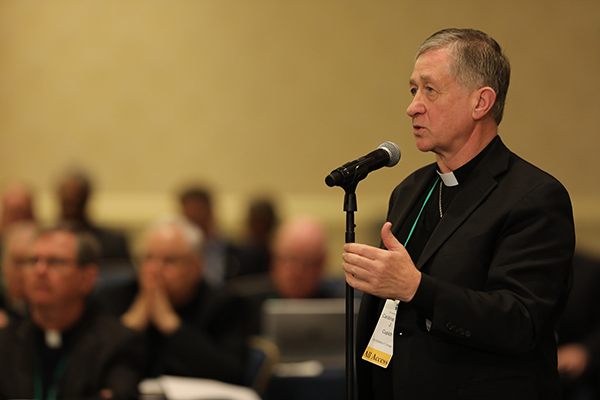
WINDSOR TERRACE — As Joe Biden assumed the presidency, two of the country’s leading bishops disagree on how to respond to the new administration of the first Catholic president since John F. Kennedy.
Archbishop José Gomez of Los Angeles, the president of the United States Conference of Catholic Bishops (USCCB), said in a statement released on Jan. 20 that his prayers are with the new president and his family. But also made clear the policies Biden has pledged in the areas of abortion, contraception, marriage, gender “would advance moral evils and threaten human life and dignity.”
“The continued injustice of abortion remains the ‘preeminent priority,’” Archbishop Gomez said. “Preeminent does not mean ‘only.’ We have deep concerns about many threats to human life and dignity in our society. But as Pope Francis teaches, we cannot stay silent when nearly a million unborn lives are being cast aside in our country year after year through abortion.”
“I am hopeful that the new President and his new administration will work with the church and others of good will. My hope is that we can begin a dialogue to address the complicated cultural and economic factors that are driving abortion and discouraging families.”
Cardinal Blase Cupich, Archbishop of Chicago, issued a prayer for the Biden Administration as well, where he called on the country’s leaders to work together “for the benefit of all its people.” Later, he criticized the statement from the USCCB president in a series of tweets.
“Today, the U.S. Conference of Catholic Bishops issued an ill-considered statement on the day of President Biden’s inauguration,” Cardinal Cupich wrote. “Aside from the fact that there is seemingly no precedent for doing so, the statement, critical of President Biden, came as a surprise to many bishops, who received it just hours before it was released.”
“The statement was crafted without the involvement of the Administrative Committee, a collegial consultation that is the normal course for statements that represent and enjoy the considered endorsement of the American bishops,” the cardinal said in another tweet.
“The internal institutional failures involved must be addressed, and I look forward to contributing to all efforts to that end, so that, inspired by the Gospel, we can build up the unity of the Church, and together take up the work of healing our nation in this moment of crisis,” Cardinal Cupich concluded.
Archbishop Gomez did not immediately return The Tablet’s request for comment.
After the tweets were published, others in the American episcopacy took to social media to defend Archbishop Gomez’s statement.
“As we pray for our new President, I offer my full and strong support for the statement issued today by Archbishop Gomez, President of the USCCB,” Archbishop Alexander Sample of Portland, Oregon, said in a tweet.
Bishop James Conley of Lincoln applauded the statement’s balance.
“I join (Archbishop Gomez) in applauding President Biden for the way his Catholic faith ‘has brought him solace in times of darkness and tragedy’ and ‘his long-standing commitment to the Gospel’s priority for the poor,” Bishop Conley tweeted.
“But I also share (Archbishop Gomez’s) deep concern for President Biden’s ‘pledge to pursue certain policies that would advance moral evils that would threaten human life and dignity, most seriously in the areas of abortion, contraception, marriage and gender.”
Many others in the American episcopacy reacted to the inauguration throughout the day — for the most part offering prayers to the new administration and outlining important areas for action.
“We pray that the President and Vice President enact policies that provide care for the forgotten and vulnerable, heal our nation from this deadly pandemic, welcome the immigrant, provide economic justice and opportunity for all, work to end systemic racism and promote peace across our country and throughout the world,” Cardinal Seán O’Malley of Boston said.
